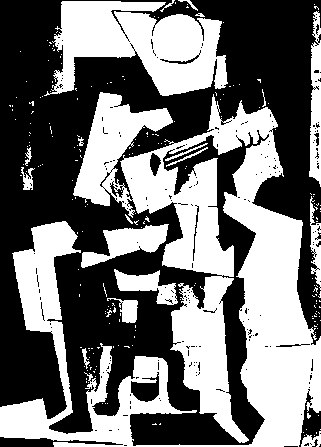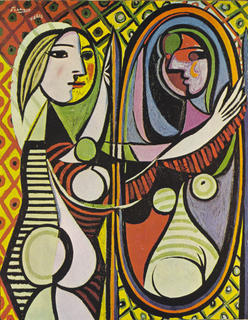Do you really need talent?

It took me fifteen years to discover I had no talent for writing, but I couldn't give it up because by that time I was too famous. --Robert Benchley
Okay, pop quiz time. Question 1: See that painting of the altar boy over there? A free bag of Orville Redenbaucher's Smart Pop to anyone who can name the artist.
BLAIIINNNNTTTT!
I'm sorry your time is up. I'll tell you the answer later. But now let's move on to our discussion du jour -- talent vs technique. Our topic today comes via my friend Reed Coleman who wrote an article recently in Crime Spree Magazine . The article, titled "The Unspoken Word, was about his experience as an author-panelist at SleuthFest last March. Reed was upset because he thought the conference emphasized technique to the exclusion of talent.
Sez Reed: "To listen how successful writing was presented at SleuthFest, one might be led to believe that it was like building a model of a car or a jet plane. It was as if hopeful writers were being told that if everyone had the parts, the decals, the glue, the proper lighting, etc. to build this beautiful model and then all they needed was the instruction manual. Nonsense! Craft can get you pretty damned far, but you have to have talent, too. Writing is no more like building a model than throwing a slider or composing a song."

Time out for Question 2: Who painted that lady at the right over there? Wrongo, gesso-breath. Moving on...
In the interest of full disclosure, I am prez of Mystery Writers of America Florida chapter, which sponsors SleuthFest. I even got duped into chairing it three years ago. That was the year our board decided, after much debate, to purposely steer SleuthFest toward the writers "workshop" conference it has become. We did it because attendees told us they didn't want any more authors getting up there and flapping their lips telling their tired war stories. They wanted authors to pull back the green curtain and show how it is done. They wanted to hear authors talk about how they created memorable characters, how they maintained suspense, how they built a structure, why they chose a particular sub-genre. That's what we gave them.
So yeah, we teach writing at SleuthFest. And you know what? I see no reason to apologize for that. In fact, I'm going waaaay out on a limb here and say that there are some published crime writers who could learn a trick or two at SleuthFest. I'm not sure how we could handle the notion of talent at SleuthFest other than having a panel where everyone nods sagely and agrees that yeah, you need some, the more the better. Maybe we could have a panel called Genetic Engineering and the Genre Writer. Just a thought...
But Reed did inadvertently raise an interesting question in his article -- can novel writing really be taught? I think it can and should be. I think unpublished folks can learn a lot from great teachers like Carolyn Wheat who wrote "How to Write Killer Fiction." (We brought Carolyn to SleuthFest one year). I think unpublished folks can go to workshops and learn the basics about plotting, character development, the arc of suspense, the constructs of good dialog. Now, does that mean they have the stuff they need to be a successful writer? (WARNING: That was a loaded question and does NOT signpost another of my churlish diatribes against James Patterson). No, it only means they might -- if they work hard -- have a chance of mastering their craft. And I don't care how talented you are, you aren't going anywhere without craft.
 Question No. 3: This one is a bit tougher....who did that black and white thing over at the right? Da-da-da-da-da-DI-da...da-da-da-di-DA-dadada (Jeopardy theme). Sorry, we haven't got all day here. Back to the blog entry.
Question No. 3: This one is a bit tougher....who did that black and white thing over at the right? Da-da-da-da-da-DI-da...da-da-da-di-DA-dadada (Jeopardy theme). Sorry, we haven't got all day here. Back to the blog entry.When I teach writing workshops, I preface everything with this one statement: I can teach you the elements of craft but I can't teach you talent. Anyone can learn to hit a baseball. But only a few are going to have Ted Williams' eye. The rest are going to be the Dave Madagans of the world -- competent major league role players. And what's wrong with that if you can have a backlist at B&N and maybe take the kids to Disney World on your royalties?
I think the big problem is a lot of beginning writers are trying to run before they can walk -- things like having multiple POVs when they can't even handle one, or interweaving flashbacks when they can't create a clear linear narrative. I tell them that writing a novel is like juggling. If you can juggle two balls well -- plot and character -- you have a good shot at getting published and maybe having a writing career. But don't worry about those other balls -- voice, style, lyricism, theme -- until those first two balls are flying high. Cuz if you drop one of those original two, nobody is gonna care how gorgeous your prose is.
As the great acting coach Stella Adler said, "Technique makes talent possible."
Okay, last question. Now, who painted that picture on the right? Ha! That's easy, you're saying. Any fool k
 nows that's by Picasso. So are all the others shown above. Except for the last one, they were all painted very early in his long and illustrious career. Picasso had talent. Major league talent. And Pablo broke the rules. But not until he had the basics down first. Technique made his singular talent possible.
nows that's by Picasso. So are all the others shown above. Except for the last one, they were all painted very early in his long and illustrious career. Picasso had talent. Major league talent. And Pablo broke the rules. But not until he had the basics down first. Technique made his singular talent possible.Tomorrow, I'm going to start a series of entries about craftsmanship. I invite you to send me some questions about whatever is bugging you -- plot, character development, dramatic arc, theme, voice. We can talk about whatever you want. But I am not going to baby you. I believe too many writing books and courses -- and writers groups! -- coddle writers. I believe that if you're going to teach writing you have to be brutally honest. Because that is the way it is in the real world, bunkie. No one's gonna baby you out there in the cold cruel world of publishing.
We'll start with the Most Common Mistakes Writers Make. Shoot, that ought to keep me blogging through the new year. Now, if you'll excuse me, I am going back to my own chapter 4. I'm having a little problem keeping that plot ball up in the air.



4 Comments:
Interesting, interesting. I'm looking forward to it. As for cons and author talks, I'm not a big con-goer, but I was at Magna cum Murder the second time this last weekend and I sat through a couple panels and I had to wonder a bit about how useful the author "advice" was. I know the audience is filled with aspiring writers (you can see my own blog for my "Open Letter to Aspiring Writers" last week for a crabby perspective on this), and I think maybe some useful things are occasionally said, but the hardest advice for aspiring authors to listen to is you can no more learn to write effectively by listening to authors talk about their writing than a brain surgeon can learn to do brain surgery by reading a textbook. At some point you have to pick up the knife and cut.
And talent is a horribly nebulous thing. There are people who early in their writing careers would seem to have none, but later on they develop amazing talent. I like this metaphor, and I'm not the originator by any means--talent is like a knife. Everybody has one. Sometimes it's big, sometimes it's little, sometimes it's inbetween. Craft and practice sharpen your knife. Even a tiny knife that's sharpened finely can cut through the toughest gristle. A big freakin' knife can cut through it without being sharp, perhaps, but runs the risk of breaking.
Best,
Mark Terry
I was at that SleuthFest three years ago with Carolyn Wheat and it was my first conference ever. That conference took me further in my writing and career in one week than all the previous years combined. I have talent but sometimes I have a hard time assembling all the parts. Suggestions I got from Carolyn on my manuscript resulted in something I don't think I could have ever come up with on my own. So thanks to all of you and long live SleuthFest!
I like your knife metaphor, Mark. To extend it to the bizarre, some writers have scapels and others have big brusing machetes. But I guess that would lead us into a discussion about style....
I once had an email argument with James Hall about style and voice. Jim maintains they are the same thing. I say they are two different animals, voice being higher up on the evolutionary scale. Lots of writers have a distinct style. But only the best have a true voice.
Who knows? But its good blog fodder fer sure.
And Byron...so glad you enjoyed SF. Carolyn Wheat was our bestselling author that year. I wonder why....
I would tend to think style and voice are different, but they're both hard to define. Stephen King hinted somewhere along the line that he describes "voice" as "diction," but I'm not exactly sure how that's separated from style. I think you can develop "style," and I'm not sure you can develop "voice," although I think writers develop it through writing and writing and writing and reading and reading and reading.
Post a Comment
<< Home